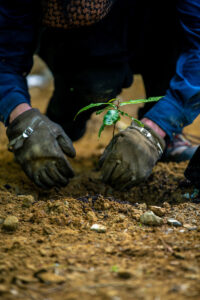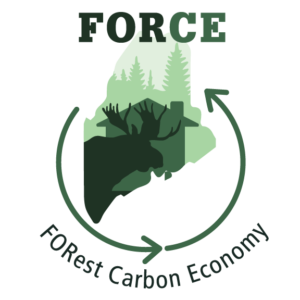UMaine FORCE

 The University of Maine Forest Carbon Economy (FORCE) is a university-wide multidisciplinary initiative that has been created to effectively address the state’s current forest carbon issues and the need for sound public policy. The initiative creates external partnerships and cross-University synergies to build necessary capacity, address core knowledge gaps, and effectively communicate key findings to stakeholders and the general public.
The University of Maine Forest Carbon Economy (FORCE) is a university-wide multidisciplinary initiative that has been created to effectively address the state’s current forest carbon issues and the need for sound public policy. The initiative creates external partnerships and cross-University synergies to build necessary capacity, address core knowledge gaps, and effectively communicate key findings to stakeholders and the general public.
Recent analyses by the University of Maine indicated that Maine’s forest currently offset nearly 80% of the state’s annual emissions, which puts the state as #4 in the United States in terms of % forest removal of annual greenhouse gases. Moreover, an analysis indicated that increasing the intensity of active forest management in northern Maine along with avoided conversion and afforestation across the state could yield about 4.5 million tCO2e/yr in additional carbon sequestration at a cost of $64 million/yr or $14/tCO2e. In addition, implementing a mix natural climate solution’s management practices across the state have the potential to make Maine carbon neutral or net zero by 2045. Potential future challenges may include a pending spruce budworm outbreak, changing fiber markets, and current and future policy.
This strategic initiative is fueled by synergies across the academic and research units within the University and around the state. It is informed by effective, mutual partnerships with industry, non-profits, state agencies, the Federal government, and international partners. The focused research initiated under this program will result in the generation of new knowledge that will enable the development of effective decision–support tools to aid key stakeholders, broaden impacts on the education of professionals, policymakers, students, and the public, and help to establish active working relationships with leading institutions, including university research centers, nationally and internationally.
Goals
- To create a comprehensive framework for holistically assessing forest carbon and its potential to revolutionize Maine’s economy and rural communities while providing solutions and understanding with global relevance and impact.
- To identify current knowledge gaps related to forest carbon storage and marketability, including effective policies, management, monitoring, and long-term accounting.
- To educate and train the next generation of land managers, policymakers, businesses, and scientists on forest carbon economy issues and opportunities.
- To translate and communicate key outcomes from the initiative to inform a diverse set of stakeholders with trustworthy and objective scientific knowledge to assist in future efforts and policy that benefit Maine, the region, and global economy and environment.
